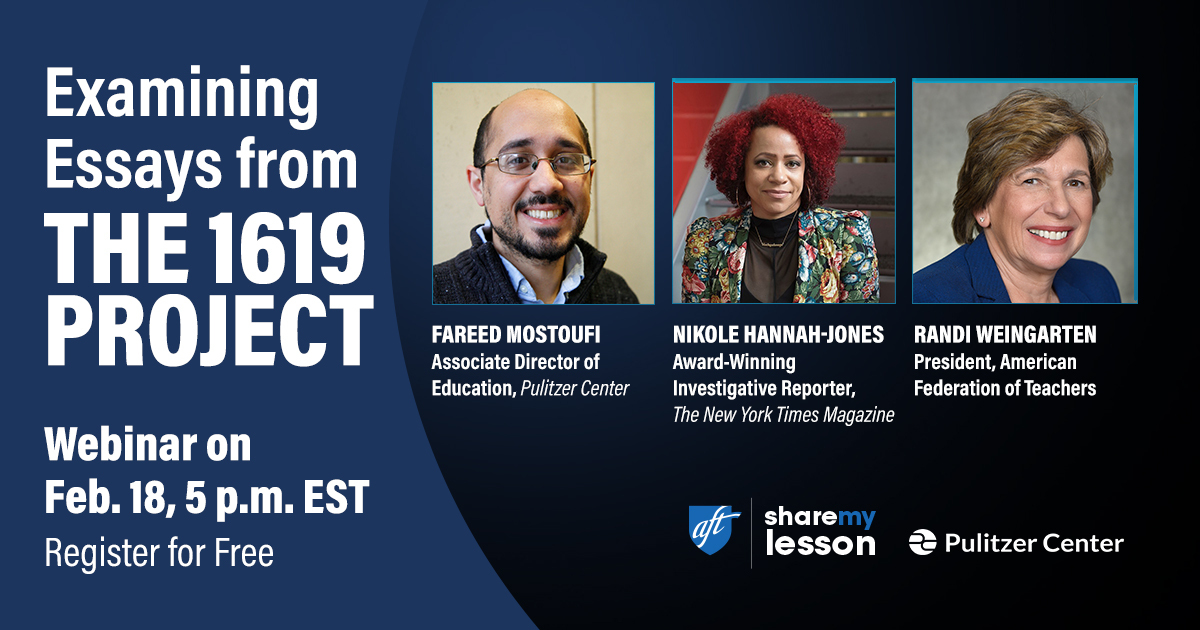Pulitzer Center Update March 31, 2021
Webinar for Educators: Examining Essays from 'The 1619 Project' with Nikole Hannah-Jones
Country:

On Thursday, February 18, 2021, 589 educators joined the Pulitzer Center Education team, who were working in collaboration with the American Federation of Teachers’ Share My Lesson program, for a Zoom webinar with New York Times journalist Nikole Hannah-Jones and researcher and Harvard Kennedy School professor Khalil Gibran Muhammad. The goal of the webinar was to introduce educators to essays from The 1619 Project, a groundbreaking edition of The New York Times Magazine that reexamines the legacy of enslavement in the United States and highlights the contributions of Black Americans to American democracy.
Spearheaded by Hannah-Jones, The 1619 Project is a journalistic, educational, and creative endeavor that seeks to to reframe the scope of American history by considering 1619, the year that the Atlantic slave trade first brought African slaves to Virginia, as foundational to American systems of commerce, culture, and politics today. In collaboration with a bevy of journalists, podcasters, poets, and more, work from the project is broad-ranging, linking present day institutions to the earliest days of the slave trade in the Americas. The Pulitzer Center is the education partner for the project.
The webinar began with an introduction from Randi Weingarten, resident of the American Federation of Teachers (AFT), one of the country’s largest labor unions. Weingarten spoke briefly about the partnership between the American Federation of Teachers and the Pulitzer Center in working with The 1619 Project. “What The 1619 Project does,” she noted, “is that it forces those who do not want to see, to see. It forces everyone to be seen.” She explained that AFT chose to partner with the Pulitzer Center on The 1619 Project because “we know that an honest and robust education is the only way to prepare our kids to go into the world as thoughtful and transformational students.”
After her introduction, Weingarten turned the webinar over to Fareed Mostoufi, associate director of education at the Pulitzer Center, who acted as moderator for the conversation between Hannah-Jones and Gibran Muhammad. After a brief discussion of the early underpinnings of The 1619 Project and their respective roles in it, the webinar moved quickly to a discussion of selected essays from the project, all of which appear in The 1619 Project issue of The New York Times Magazine. The first essay covered was Gibran Muhammad’s “The Barbaric History of Sugar in America,” which explored the brutal and physically punishing conditions of early plantation slavery, and its connections with the proliferation of sugar as a cash crop in 17th century America. Other essays discussed included Hannah-Jones’ “America Wasn’t a Democracy, Until Black Americans Made It One,” which examines the ongoing role Black Americans have played in building American democracy. Hannah-Jones also spoke about how she conceived of the project, and the development of The 1619 Project podcast, broadsheet, and more.
Toward the end of the webinar, Hannah-Jones and Gibran Muhammad spoke to the different ways educators had implemented materials from The 1619 Project into their curriculums. Speaking about the project’s ethos of ongoing revaluation and recontextualization, drawing from his own experience teaching educators receiving graduate degrees at the Harvard Graduate School of Education, Gibran Muhammad noted the importance of teachers taking time to question the way they had been taught history themselves. “Teachers can’t be good at what they do unless they understand the material themselves,” he noted. “And I think that’s what The 1619 Project offers people: It’s not the beginning and end of the learning process, it’s a call to action to begin to fill in for yourself the things that you weren’t well-taught—[and] none of us were.”
The webinar closed with a question-and-answer session from the audience of educators, moderated by Kelly Booz, director of Share My Lesson. Questions revolved around topics such as the pushback that educators may face from districts and families when trying to implement curriculum from The 1619 Project, which components of the project are most conducive to curricular materials in classrooms, and more. Hannah-Jones and Gibran Muhammad responded to the questions thoughtfully and with warmth. When considering the concept of American history as Black history, Hannah-Jones noted, emphatically, that “the entire argument of The 1619 Project is that America would be unrecognizable—both the things that make this country great and the things that make it terrible—if it were not for slavery and the contributions of Black Americans. All of the essays in the project make that argument about different areas of society … we are impacted by this past whether we acknowledge it or not.”
Hannah-Jones closed the webinar with a quote from Edward Ball’s book, Slaves in the Family: “Reconciliation is not about being nice. It’s not about pretending that things were other than they actually were...Reconciliation is about being able to look the tragedy of American history in the eyes.”
Essays and other work from The 1619 Project are available to read on The New York Times Magazine website. Curricular materials and resources to help educators implement work from The 1619 Project into their own classrooms can be accessed on the Pulitzer Center website.